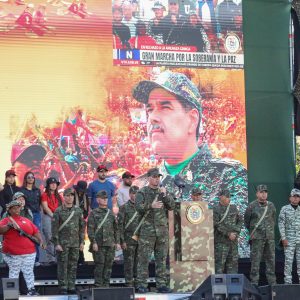‘Bombs all around us’: More Rohingya brave death to escape Burma violence
COX’S BAZAR, Bangladesh (AA) – For the past three years, Mohammad Lalu had been diligently saving up, bit by bit, for one goal: to ensure that he and his family of eight had $2,000 to cross the Naf River and reach a Rohingya refugee camp in neighboring Bangladesh.
Lalu was not among the approximately 750,000 Rohingya refugees who fled Burma in August 2017 to escape what the US and various rights groups have recognized as a genocide by the Burmese military.
He was unwilling to leave his village in Buthidaung, a small town in Burma’s Rakhine State, and abandon his home and farmland.
His area, Lalu shared, had been relatively sheltered from the violence and massacres.
However, after the coup in 2021 and rise in clashes between the Arakan Army rebel group and Burmese military, he was always fearful for his family’s safety and future.
The situation further worsened in November last year, when several homes in his village were destroyed by mortar shells and bombs reportedly dropped by drones.
By early August this year, his village and the surrounding area had effectively turned into a battlefield.
Despite being nowhere near the $2,000 needed for the escape, Lalu took a chance and convinced a boatman to attempt the crossing.
“I heard that the Bangladeshi government had fallen on Aug. 5 and that the border was unguarded, so we tried to cross on Aug. 6,” Lalu said at a refugee camp in Cox’s Bazar, southern Bangladesh.
Upon reaching the Naf River, Lalu saw “at least 100 floating dead bodies.”
“I was terrified when I learned that drones had been bombing people trying to cross on Aug. 5. My family and I hid in a small forest near the shore and made another attempt to cross at night,” he said.
When they moved again, a few hours after midnight, a mortar blast left Lalu with severe injuries to his right leg.
“It felt like bombs were falling all around us. I lost my leg,” he said.
“One of my brothers was hit in the head and died.”
Lalu is among at least 2,000 individuals who have successfully crossed the Naf River since Aug. 5, risking death to reach the world’s largest refugee camp in Bangladesh.
Like many law enforcers in the country, officials of the Bangladesh Border Guard (BGB) had abandoned their posts out of fear of retaliation when the massive student-led protests forced the ouster of former Prime Minister Sheikh Hasina.
At least two BGB officials, who preferred anonymity and were among many to resume their duties on Aug. 21, confirmed that there has been a “significant influx of new Rohingya refugees since Aug. 5.”
Several officials at refugee camps reported that the figure of 2,000 new arrivals is a conservative estimate, and the actual number could be higher.
Sona Mia, 40, also took the same route across the Naf River with his entire family to reach the Hakimpara refugee camp in Ukhia, southern Bangladesh.
“The Arakan Army was slaughtering our neighbors and forcibly enlisting young Rohingya. Those who resisted were killed along with their families,” Mia said.
He feels relieved to be in Bangladesh and hopeful for a new start.
“At least we no longer fear for our lives and are safe here,” he said.
– Hope for Rohingya?
This past Sunday, Aug. 25, was the seventh Rohingya Genocide Day.
At a large gathering in Camp 4 in Cox’s Bazar, Rohingya leader Mohammad Alam reiterated their call for safe repatriation and protection of their rights as refugees.
“For the new government in Bangladesh led by Muhammad Yunus, we urge them to first ensure our refugee rights and then facilitate our safe and voluntary repatriation,” he said.
Maung Zarni, co-founder of the rights group Free Rohingya Coalition, said that he hopes the interim government’s policies on the Rohingya issue will be “kinder and more strategic” than Hasina’s administration.
He said Yunus should take the initial step of “recognizing the 1 million Rohingya genocide survivors as both refugees with rights under international law and as ethnic Rohingya.”
However, Zarni warned that Western countries “will likely not resettle any Rohingya survivors,” pointing to the “entrenched racist and anti-Muslim attitudes and policies in Europe, US, Canada, and Australia.”
The West will also “struggle to assist Yunus in securing meaningful cooperation” from either the Arakan Army or the Burmese military, he said.
Even if Western actors were willing to help with the conflict in Burma, it would not “guarantee the repatriation of the Rohingya,” he added.










